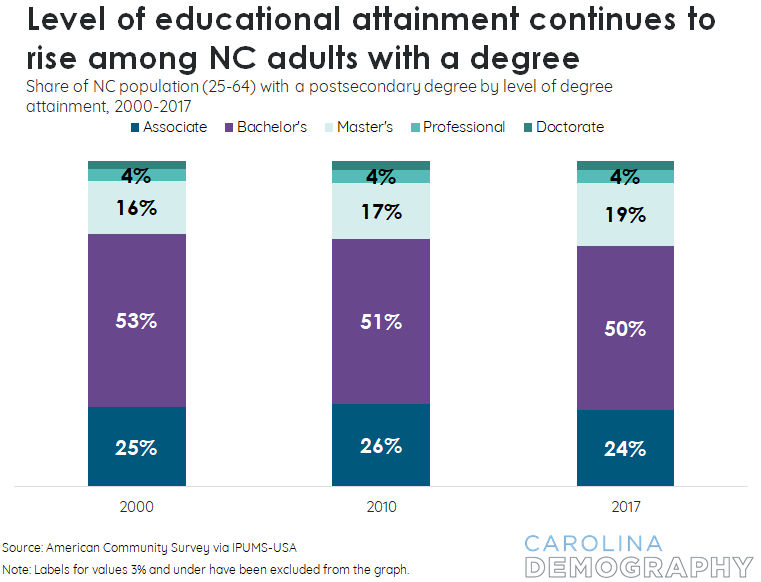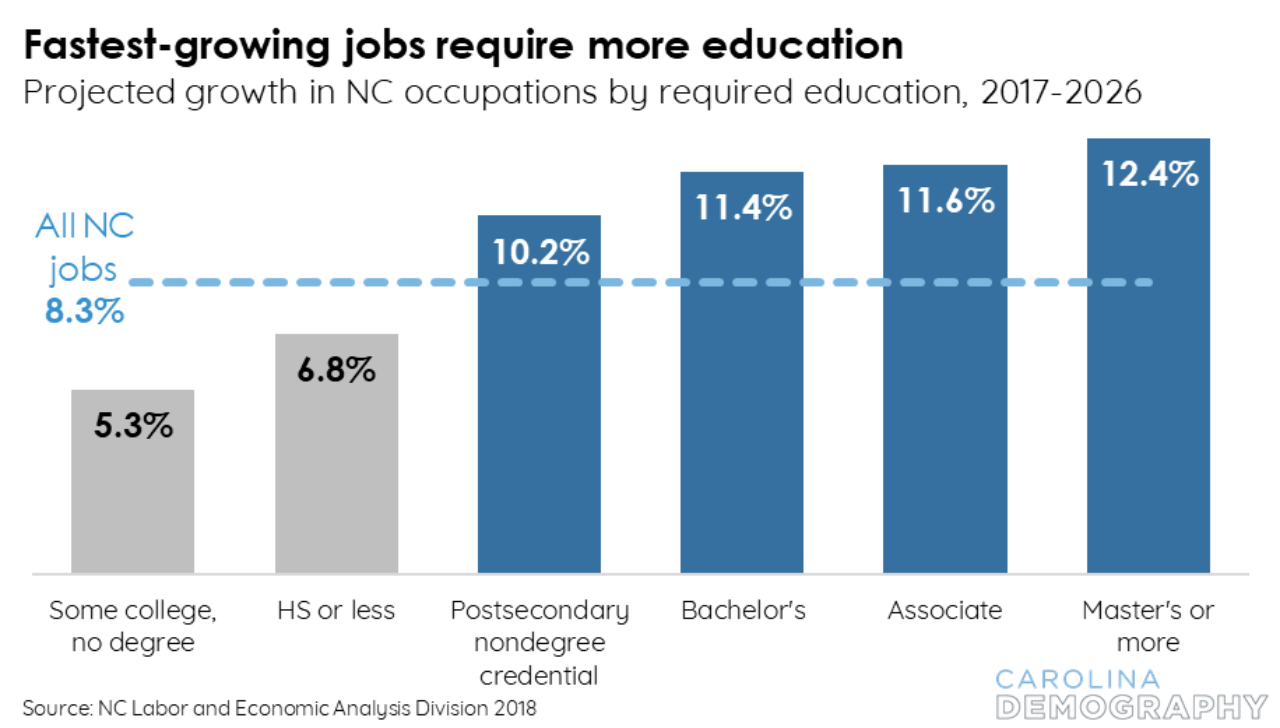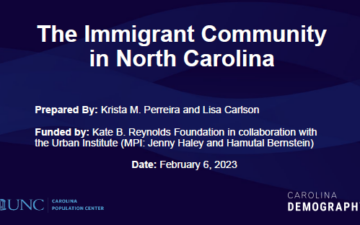Rising Attainment Among North Carolina’s Degree-Earners

Forty-three percent of North Carolina’s adults aged 25-64 held some type of postsecondary degree in 2017—just over 2.3 million residents in the state. This share has risen five percentage points since 2010, and ten since 2000. In total, North Carolina gained 932K working-age adults with an Associate degree or higher from 2000 to 2017, and among these adults, the level of degree attainment continues to rise.
In 2000, the majority of NC adults aged 25-64 with a postsecondary degree held a Bachelor’s (53%). This share dropped three percentage points as of 2017 to just half of all degree holders. An additional one-fourth of degree-holders had an Associate in 2000. This share dropped one percentage point by 2017 to 24%.
The four percentage point (pp) loss among these two groups is accounted for by growth in Master’s (+3pp) and Doctoral degree holders (+1pp) over the same period. In 2000, 16% of degree-holders in North Carolina had a Master’s and 2% held a Doctorate, growing to 19% and 3% in 2017, respectively.

The number of NC adults aged 25-64 with a Master’s degree grew by over 100% – the only group to do so – from 222K in 2000 to 446K in 2017. This growth rate is followed closely by growth in the number of working-age adults with a doctoral degree (93%), from 33.3K in 2000 to 64.2K in 2017. Bachelor’s degree-holders, by comparison, grew the slowest at 59%, or 431K, since 2000. The difference in growth rates is partly due to the large number of Bachelor’s degree-holders compared to Master’s and doctoral degree-holders.
This growth in advanced degrees follows closely with the growth in occupations by degree level. According to data from North Carolina’s Commerce Department, jobs requiring a Master’s degree or higher are projected to have the fastest growth through 2026—their projected growth is 4.1 percentage points faster than the average growth for all jobs in NC. While occupations requiring an advanced degree still comprise a smaller overall share of the total job market – contributing to some of this fast growth – demands for the labor market are also experiencing real shifts. According to a nationwide survey conducted by CareerBuilder, “60% of employers who were satisfied with hiring high school graduates in the past claimed their work requires the skills held by those who completed higher education”.

With that said, North Carolina residents considering a postsecondary degree should recognize that job growth is projected to exceed the state average for any occupation requiring at least an Associate degree. An advanced degree may not be suitable for everyone, but some postsecondary attainment is increasingly recommended. Occupations requiring a high school degree alone have projected growth 1.5 percentage points slower than the average for all jobs. Growth will be even slower for those requiring some college, no degree at 3 percentage points less than the average for all jobs.
On the other hand, individuals can expect much faster-than-average growth in the skilled-service sector. These occupations typically require an Associate or a nondegree work credential, and will exceed the average for all jobs by 3.3 percentage points and 1.9 percentage points, respectively.
Need help understanding population change and its impacts on your community or business? Carolina Demography offers demographic research tailored to your needs.
Contact us today for a free initial consultation.
Contact UsCategories: Carolina Demographics, Education
Tags: 25-64, degree-holders, degrees, education, educational attainment, Job growth, jobs, postsecondary, postsecondary attainment

The Center for Women’s Health Research (CWHR) at the University of North Carolina School of Medicine released the 12th edition of our North Carolina Women’s Health Report Card on May 9, 2022. This document is a progress report on the…

Dr. Krista Perreira is a health economist who studies disparities in health, education, and economic well-being. In collaboration with the Urban Institute, she recently co-led a study funded by the Kate B. Reynolds Foundation to study barriers to access to…

Our material helped the NC Local News Lab Fund better understand and then prioritize their funding to better serve existing and future grant recipients in North Carolina. The North Carolina Local News Lab Fund was established in 2017 to strengthen…
Your support is critical to our mission of measuring, understanding, and predicting population change and its impact. Donate to Carolina Demography today.